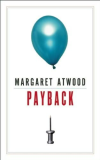Payback : Debt and the Shadow Side of Wealth
Margaret Atwood, House of Anansi Press, Canada, octubre 2008

You can’t say no one saw it coming. Margaret Atwood did. Frankly, I don’t even want to know when she wrote this book. Either Atwood — unlike, say, Alan Greenspan — predicted the global economic meltdown a long time ago, long enough to write the book and see it through the slow conveyer belt of publication, or she wrote it so recently and so quickly that my head would spin with jealousy and wonder. Payback is a delightfully engaging, smart, funny, clever and terrifying analysis of the role debt plays in our culture, our consciousness, our economy, our ecology and, if Atwood is right, our future. At the beginning of the book, she presents her work as an inquiry into « debt as a human construct — thus an imaginative construct — and how this construct mirrors and magnifies both voracious human desire and ferocious human fear. » If this sound dry and forbidding, have no worries. Atwood breezily approaches her subject with anecdotes, memories and references ranging from Plato to Star Trek. If Scrooge is too highbrow for you, just hang in there and she’ll woo you with a trenchant analysis of Scrooge McDuck. Atwood, a Canadian novelist and woman of letters, is interested in debt as a large concept, a thread that worms its way through all aspects of human life : our psychology, religions, relationships and, of course, finances. She goes back to ancient worship to show how, in the afterlife, the soul’s status was valued using models of credit and debit. The word for sin and debt, Atwood observes, are the same in Aramaic, the language spoken by Jesus. Indeed, she points out how the language of debt permeates religious and moral discourse. Jesus comes to earth to redeem sinners. Criminals go to prison to pay their debts to society. There is, she says, a whole language of financial exchange embedded in our moral compasses. As for why this should be so, Atwood relies on a couple of pillars to prop up her argument. First, she sees narrative as central to human consciousness, and narrative works in terms of debits and credits. If motivations and desires can be reduced to a credit and debit system, then the stories we tell — and she finds plenty of examples from Marlowe, Dickens, George Eliot and countless others — are often literally, and always metaphorically, about the human desire to even things up. « Without story, » she writes, « there is no debt, » but the argument appears to work both ways. Without debt, there is no story. This point leads to the second, and perhaps more sturdy, pillar of her argument : management of debt is an exercise in fairness. One of the metaphors to which she returns frequently is that of an experiment done with capuchin moneys who are rewarded for performing simple tasks with a piece of cucumber. Then some of the monkeys begin receiving grapes — a more prized food — for performing the same task. Soon none of the monkeys is willing to work, because once they view their labor as worth grapes, there’s no way they are going to expend their energy if all they are going to get is a lousy cucumber. What we most want, says Atwood, is to be treated fairly or, better yet, more than fairly — but never unfairly ; that is not acceptable. At times it seems to be Atwood’s own notion of unfair treatment that motivates this book. Not her personal grievances, of course, but her perception of global imbalances, her feelings of cosmic injustice when she looks upon those who get all the grapes and the dangerous resentment brewing among those who are lucky even to get cucumbers. If systems, from personal relationships to global financial markets, operate on the assumption of basic fairness, then what happens when actors cannot or will not repay their debts ? As we’ve seen with investment giants over-leveraged with bad derivatives, everything begins to break down, including the illusions that once held things together. Early in Payback, Atwood recalls learning about banks and interest as a child, at first finding them as mysterious as the tooth fairy. « If I stopped believing in banks, would they too expire ? » she wondered. Later in the book, she observes that « when people lose faith in the value of a currency . . . money simply melts away, like the illusion it always has been. » These are scary times for this sort of observation. Financial chaos, global warming, food shortages, environmental degradation and the possible extinction of the human race are all potential results of a monumental credit imbalance. A small number of people have way too many grapes. Inequity is reaching a boiling point, and on human, national, economic and environmental fronts, we are setting ourselves up for some monumental payback. It’s scary stuff, but lucky for us it is also extremely entertaining.
From The Washington Post’s Book World/washingtonpost.com Reviewed by David Liss
Copyright 2008, The Washington Post. All Rights Reserved.
